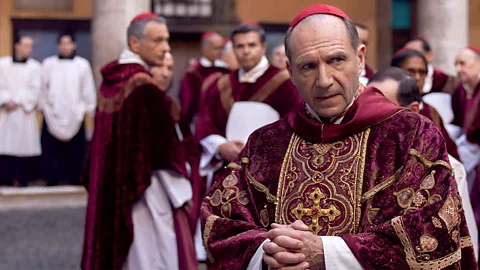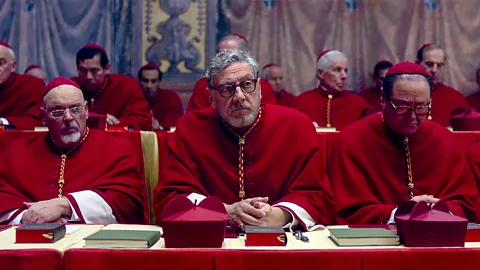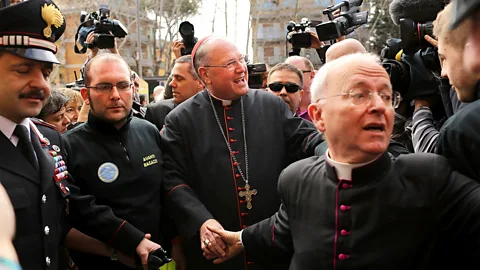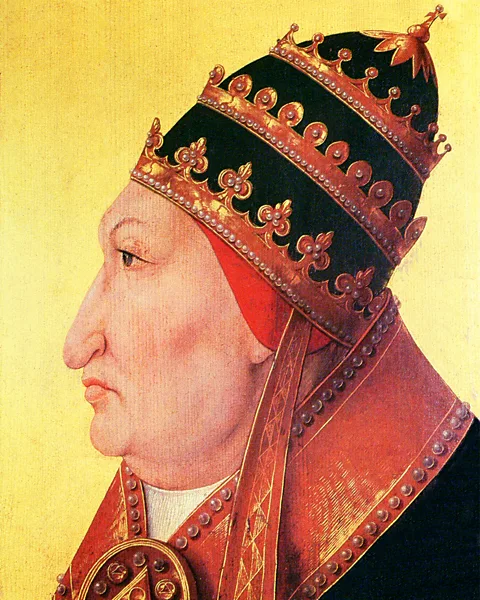'They have the same vices as we do': how new thriller conclave lifts the lid on pope's election
 Focus feature
Focus featureBased on a bestselling novel by Robert Harris, the Oscar-tipped film imagines what goes on behind the scenes of a secretive process – complete with intrigue, backbiting and leaks.
With rival factions of cardinals scheming to elect the next pope, US Cardinal Bellini (Stanley Tucci) rejects a suggestion that he use stolen documents to discredit a rival. His decision is not entirely moral. “I'll be the Richard Nixon of the Popes,” he says, in a scene that captures Conclave's ingenious plot, wit and colorful characters. The film takes us behind the scenes of the secretive, ritualistic process that takes place at the Vatican after the Pope dies, but it plays like a bracing, contemporary political thriller. Edward Berger, of All Quiet on the Western Front (2022) Won the Oscar for Best International Film, handling real-life conclaves with great precision and fidelity, capturing an essential conflict: this ancient tradition has now reached the media-flooded twenty-first century.
That link between ancient and modern actually inspired Robert Harris' 2016 bestselling novel of the same name, which is the basis for the film. Harris told the BBC that the idea came to him in 2013 when, in the middle of finishing the Cicero trilogy of novels set in ancient Rome, he was watching news of the election of Pope Francis. Harris said: “Right before [new] The Pope revealed himself on the balcony, the windows on either side filled with the faces of the cardinal electors who had come to see him. I looked at their faces, all old men, sly, some very gentle and holy, some quite cranky looking. And I thought, 'Oh my God, I'm looking at the Roman Senate.'” When he started, he said, “I just thought it was absolutely raving, politics was raw.”
 Focus feature
Focus featureIn his Oscar-winning performance, Ralph Fiennes anchors the film and adds earnest spiritual inclinations as the fair-minded English Cardinal Lawrence, tasked with directing the conclave even as his confidence in his own vocation falters. The story begins with the death of the Pope, and the filmmakers did extensive research to reflect the authentic account of a conclave. Cardinals come from all over the world and live in austere rooms in the Casa Santa Marta, a dormitory-like building. Once the conclave begins, they are separated, surrendered their phones and other devices, cut off from internet access or any news from the outside world, and sworn to secrecy. In detail, they vote in the Sistine Chapel, writing the name of a pope on a slip of paper, which is then placed on a silver plate and deposited in an urn. The voting continues day after day until the Pope is elected. All true, except for the Casa Santa Marta and the Sistine Chapel in that film, it was made at Cinecittà Studios in Rome.
Political division
All the rhetorical trappings, precise details and bright-red cardinals' hats don't get in the way of political power struggles, which are equally realistic. Berger told the BBC that the cardinals have understandable human ambitions like any institution. “The CEO is gone and people will come out fighting, they'll get their knives out and get that job, in this case in Washington D.C. or the church,” he says. “We think of it as an ancient spiritual ritual, and we think of these people as sacred. We put them on this pedestal, and when you look closer, they have cell phones, they smoke, they have the Pope in a plastic body bag just like us. Ended, and it was important to me, to bring them into modernity.
Harris said he wanted to “reflect the real divisions within the Church, which exist just as much as they do in secular politics”. As in today's politics, the imaginary rivals break down sharply into liberal and conservative camps. Bellini, one of the pioneers, was a liberal idealist, open-minded on issues including the role of women in the Church. Another pioneer is Italian Cardinal Tedesco (Sergio Castellito), a conservative who wants to return to the Latin Mass. Other contenders include the enigmatic Canadian Tremblay (John Lithgow), Adeyemi (Lucian Massamati), who hopes to become the first African Pope. , and the lesser-known Benitez (Carlos Diehez), who was secretly appointed Cardinal of Kabul (a position that does not actually exist). Berger creates suspense such as intrigue, leaks and scandals, in a taut style that calls to mind a political thriller like All the President's Men.
Outside the quiet of the Sistine Chapel, Bellini says he doesn't want the job even though his supporters voted for him to block Tedesco. That plot escape is not far-fetched. Dan Walkin, who reported for the New York Times on the conclaves that elected Pope Benedict XVI in 2005 and the current Pope Francis in 2013, told the BBC: “A cardinal who wants to be pope will do the exact opposite of tooting his own horn. Such open ambition is a deal. Breaker.”
 Getty Images
Getty ImagesIn a book-length interview published in April, Pope Francis He himself revealed that he unwittingly endorsed Cardinal Joseph Ratzinger as a candidate in 2005 in an attempt to prevent his election to Pope Benedict. Even when the Cardinals are singled out, the media throws shade. In the film, when a cardinal's past is exposed in conclave by a rival, Lawrence flatly tells him, “You'll never be pope.” Allusions to the well-known real life of the Church scandal Regarding sexual abuse by priests, he said: “Nothing scares our Curia more than the thought of more sexual scandals.”
A history of controversy
In the 15th century, Alexander VIA Borgia, allegedly bribed his way into office. In the 16th century, a conference lasted 72 days, and when a pioneer died it was rumored that he poisonous. At the time, Rome's bankers bet on who would win, creating a direct line from history to the circus-like atmosphere of today's media world. In 2013, the BBC Coverage stated, “St. Peter's Square has turned into a kind of coliseum. TV tents in every concession stand waiting for the game to begin.” D guardian A choose-your-own pope feature continues.
Today, some strategies play out in public. Before the vote began in 2013, American cardinals were forced to stop giving news briefings under pressure from other cardinals, after it became known that Italian cardinals continued to leak. Press. But in the film, most of the vote-whipping still happens behind the scenes, before and after the conclave officially begins.
Walkin says that during this period, “cardinals would often eat together and drop hints about who they thought would be the best candidate,” a fact that is a central element of the film—though the fictional cardinals do much more than hint.
Although Berger agrees that Conclave is often driven by politics, he notes that “a deeper kind of second layer is what the movie is really about,” namely Lawrence's inner turmoil. “He has a crisis of faith. He says, 'As a cardinal I have difficulty in prayer.' It's like I said, 'I have a hard time trusting the pictures my camera captures.' It's an existential crisis.” Berger says the problem should be related to the audience in general. “It could be religion, but it could also be inner confidence. It really spoke to me and why I wanted to do the film,” he says.
 Getty Images
Getty ImagesAnother less important but important aspect of the conclave is Isabella Rossellini's role as Sister Agnes, who is in charge of the nuns brought in to cook, clean and generally serve the cardinals. They are meant to remain quietly in the background, but as Agnes says in a plot-changing scene, “God gave us eyes and ears.” Berger says, “I always told Isabella, when you're in the scene, we really need to see you and see what you're thinking and be with you. So she always had close-ups, she wasn't just part of the scene.” He adds, “The patriarchal structure is cracked through this theme.”
All of these heated elements, including Agnes' introduction, lead to a shocking conclusion that should not be spoiled. Harris says, “I didn't just end up with a kind of fun twist. It's built into the very fabric of what the novel and the film are about. He also got support from one of his background sources.” helped me – he died sadly, so I'm sure he wouldn't mind me telling him – English Cardinal Cormac Murphy-O'Connor.” After he sent Murphy-O'Connor a copy of the book, Harris said, “To my surprise He wrote me a fond letter about it saying, 'A conclave is just like this. Your central cardinal is exactly the way we want cardinals to be. And for the ending, I told myself it's just a novel.'”


